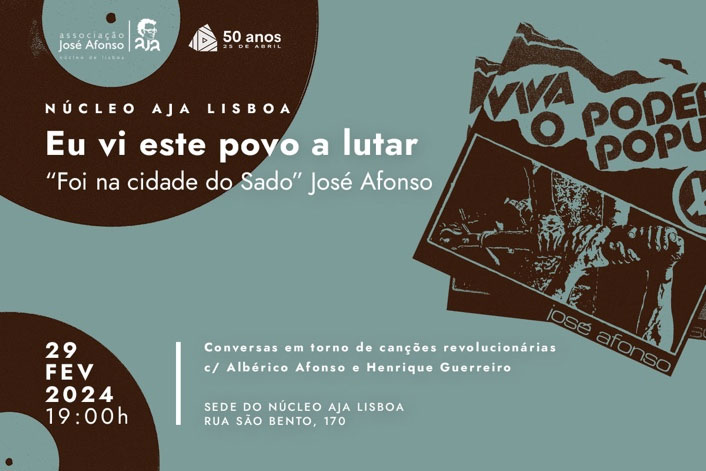Song “Foi na Cidade do Sado” by José Afonso is discussed in the cycle “I saw these people fighting”
Conversations around revolutionary songs, at the Núcleo AJA Lisboa - Associação José Afonso
In commemoration of the 50th anniversary of April 25, 1974, the Núcleo AJA Lisboa – Associação José Afonso hosts the series of conversations “I saw these people fighting”, around a set of revolutionary songs.
The sessions are divided into a first part of listening to the theme and a second part with two interventions on the conditions in which the song was created and its respective historical context.
On February 29th at 7 pm, Albérico Afonso and Henrique Guerreiro talk about the song “Foi na Cidade do Sado” by José Afonso.
José Afonso created this song in 1975, reacting directly to the events that occurred in Setúbal, on the night of March 7, 1975. The protest against the holding of a PPD/PSD rally at the Clube Naval Setubalense triggered clashes with the police, who violently repressed the popular demonstration, causing one death and two dozen injuries.
The song was included in the single “Viva o Poder Popular”, published by LUAR – Liga de União e Ação Revolucionária, an organization to which José Afonso belonged and to whom he ceded the respective rights.
Albérico Afonso is a historian, author of “Setúbal, red city. 1974-1975” and one of the introductory texts to the album, reissued by Associação José Afonso in 2013.
Henrique Guerreiro, a friend and comrade of José Afonso, joined the Setúbal group of LUAR.
Conversation about the song “Foi na Cidade do Sado” by José Afonso
Guests: Albérico Afonso and Henrique Guerreiro
in Cycle “I saw these people fighting” – Núcleo AJA Lisboa – Associação José Afonso
Thursday, February 29, 2024 – 7:00 pm
Rua de São Bento 170, 1200-821 Lisbon
About the cycle “Come 6 more”
In commemoration of the 50th anniversary of April 25, 1974, the Núcleo AJA Lisboa – Associação José Afonso carries out the cycle of conversations “I saw these people fighting”, around a set of six themed protest songs.
Until the end of 2024, several guests will come together to pay homage to some of the most emblematic collectives and revolutionary singer-songwriters, such as José Afonso, Coro Popular O Horizonte é Vermelho, GAC – Vozes na Luta, Fernando Tordo, Luís Cília and José Mário Branco.
The sessions are divided into a first part of listening to the theme and a second with two interventions on the concrete conditions of the song’s creation and its respective historical context.
A cycle is willing to prove that “soft singing in hard lyrics never made revolutions”!
The complete program “Come 6 More”
- February 29th at 7 pm | José Afonso, “Foi na Cidade do Sado” w/ Albérico Afonso and Henrique Guerreiro
- March 21st at 7pm | Popular Choir O Horizonte é Vermelho, “Honra a Ribeiro Santos” w/ Carlos Moreira and Maria José Campos
- May 25th at 5pm | GAC – Vozes na Luta, “Zé Diogo” with Constantino Piçarra and Carlos Guerreiro
- July 25th at 7pm | Fernando Tordo, “Fado de Alcoentre” w/ Fernando Tordo and Alfredo Caldeira
- September 26th at 7 pm | Luís Cília, “11 de Março” with Luís Cília and Ricardo Noronha
- September 28th at 7 pm | José Mário Branco, “I saw these people fighting (Confederation)” w/ Fernando Rosas and Manuel Monteiro
The José Afonso Association (AJA) is a civic-cultural, non-denominational association, created on November 18, 1987, to honor José Afonso’s legacy as an artist and citizen committed to the cause of Freedom and Solidarity.
Zeca Afonso was an attentive, free, restless human being with profound critical humanism.
In the songs, whether those with touching lyricism or those combating and denouncing exploitation and the hypocrisy that covers it, he gives voice to the struggle and anger of the most disadvantaged and to the liberation aspirations of oppressed peoples, pointing to Utopia as the only “ smoke next” for the full realization of the human being.
AJA, in its mission to value and disseminate this legacy, as a universal heritage, has defined concrete objectives that guide it. Realizing them will be a constant task for which the efforts of those who are truly interested in contributing so that generations remain heirs to a unique and timeless work and do not lose track of José Afonso’s message.






